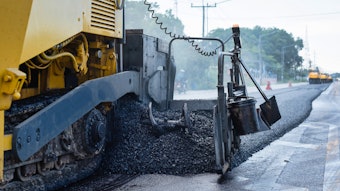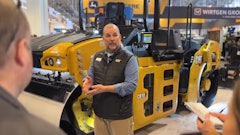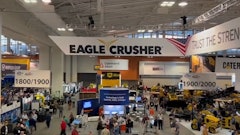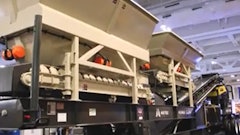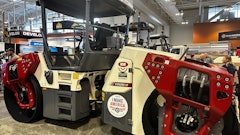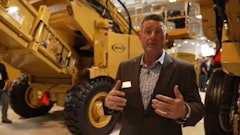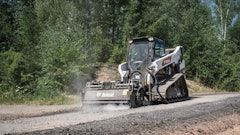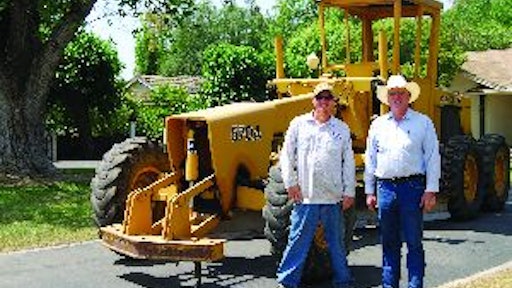
Some people might view Worthington Paving as a throwback to the good old days when "hands-on" was the way of the world, when integrity was expected, and when doing it right the first time was the only way to do business.
If that's how they view it, so be it. Dave Worthington, second-generation owner of the 46-year-old paving company in Visalia, CA, wouldn't care. He's just doing what worked for his father, what's worked well for himself, and what he's teaching his son who plans on taking over the family business.
"My 10 fingers do the work," Worthington says. "I'm out with the guys every day. That way when I walk away I know it's done right. And I enjoy the work. If you don't enjoy the work, get out of the business."
And while it's clear Dave Worthington likes the business, enjoyment of the job is not what makes Worthington Paving successful. What has made him an in-demand contractor in the Visalia area is his solid reputation that precedes him on commercial and subcontracting jobs. He is successful because he is a hands-on contractor, because he insists on doing it right the first time, and because he's skilled enough and flexible enough to juggle a variety of work ranging from shoveling mix into a pothole to grading and paving a good-sized parking lot.
Worthington says grading and paving are mainstays of the company and always have been. He says 60% of the work is paving, 20% is grading, and 20% is sealcoating, which the company added in 1973. He says 20% of the company's work is subcontracted from larger area companies, who he makes every effort to take care of. "We do a lot of small stuff the big guys don't want to do," Worthington says.
Worthington Paving was started by Dave's father, John, in 1946 as a paving and grading company and little has changed since then. Dave grew up in his father's business, John earned his contractor's license in the early 1960s, and Dave received his C-12 license (excavating, paving, grading, trenching and surfacing ) in 1973. In 1978 he received his A license (general engineering), and in 1986 he bought the company from his father. His son, Chandler, will soon receive his C-12 license. Employees are hired seasonally but rarely does the entire team total more than four people.
And Worthington has worked for the industry, too, serving on the state contractor licensing board and working on the state's committee to update construction licensing test.
"I was one of those who convinced them to add a parking lot section to the test," Worthington says. "Before it only focused on roads and, as we all know, that's only a part of what paving and grading contractors do."
Reputation and integrity
Worthington doesn't advertise much outside of the Yellow Pages, which he swears by, and he's tried advertising on the Internet with mixed success. "We don't worry too much about marketing because the best advertising we've got is word of mouth," Worthington says. "We've got a great reputation, built up over the years, and that's what opens a lot of doors for us."
He says the reputation stems directly from his and his father's approach to the business.
"We stand behind our work, it's as simple as that," he says. "And we are able to stand behind our work because there's only one way to do it, the right way, so let's do it right. That's what makes us successful."
"Ours is a hands-on business. I'm right there on every job with the guys and I can see what's going on, so I know it's going to be done right," he says. "I always tell them 'Let's take a little more time and do it right the first time. Go-backs cost money'."
He says his reputation plays a role with both new customers and in the jobs he gets as a subcontractor.
"We're more of a mid-to-high-priced contractor but because of our reputation that's never been an issue. I know for a fact my customers have said 'If you need a job done, call Dave Worthington' and we do get those calls. And while we've had people say we're a little more money than some contractors they give us the job anyway. They say 'we know you'll do it right.'"
And it works on the subcontracting side of the business, too.
"Those are the kinds of jobs you take with extra special care. When they're just giving you work you take care of them. You respond quickly, maybe give them a little better price, because they don't want a bid they just say 'Dave, go do it.' They just call us up and say here's a job, go do it for us, and send us a bill."
And just as he has his hands on the actual job, he has his hands in the sales efforts, too. "I make it a point of returning every job call I get within 24 hours, and I try to set up a meeting as soon as possible," he says.
And when he first meets the customer, "I shake his hand and I always stick a business card in his hand. And if it's a commercial person I ask for a business card back. I make sure to give him a business card every time we meet. You'd be amazed at how often those business cards turn into jobs," Worthington says.
He says that once a meeting is held he will turn around a bid in no more than three days, often in one day.
Tips to compete
Worthington knows that as a small company there are some things he just can't offer his customers, so he has taken a number of steps to make sure he stays competitive, efficient, and to differentiate himself from his competition. Some of the efforts relate to job quality, and some relate to cost control. But all of them work to enhance Worthington Paving's reputation and success:
- Makes his own base material. Leftover hot mix asphalt is taken back to his yard (5 acres in the country) and spread out and mixed with rock dust or decomposed granite. This material is then used on jobs, such as private jobs, that don't require Class 2 base. Currently Worthington has between 50 and 75 tons on hand.
- No overcuts allowed on sawcut edges for remove-and-replace digout repairs. "I don't allow overcuts at the corners because they're too hard to fill. It's too hard to get material into those cuts, and the result is a repair that won't last as long as it should."
- Smooth grading. "When we do a paving job, we make sure our base work is smooth like glass so that when the paver goes over it there are hardly any adjustments to make at all," he says. "We can just let it float and go on through."
- To help keep costs down and to maintain control over as much of the job as possible Worthington also hauls its own hot mix on small jobs. He says the company's two bobtail dump trucks can haul almost 8 tons of mix, whether base from its own yard or hot mix from a plant. "We have hauled up to 25 tons on a job if the plant is close enough," he says. "If the distance from the plant is too great we'll bring in the trucks that can haul 25 tons in a single load. Hauling ourselves helps us be competitive," he says.
- When sealcoating Worthington always trims the edges twice. "We put two coats on everything else but many contractors only trim the edges once because it takes more time."
- Finish driveway sealing with a nice straight edge. "We do a lot of sealcoating out in the country and where the driveways come out to the edge of the road, we put a straight edge on it, tape it off, or pop a chalk line to get a nice, neat straight edge."
Flexibility and versatility
As important as his reputation, Worthington says versatility and flexibility are key to the company's success. "Because we're a small operation we can make adjustments quickly. That's an aspect of the business we like and our customers like it, too."
He says that on most days he will complete up to four different jobs, depending on their size and location. A typical week might involve construction of a base 40 miles away, trench paving in an alley for a plumbing contractor, sealcoating a long driveway in the foothills, and pavement repairs in a nearby parking lot. He has also done work for out-of-state property managers and even contractors such as Rose Paving, who have accounts they need taken care of in California.
"With our reputation and longevity we're always doing something," Worthington says. "We're pretty versatile, and that helps."
To be more efficient Worthington groups similar types of work together. "It's easier and more productive for us if I can group all the trench paving together - even if they're miles apart - and do them in the same day," he says. "That enables us to outfit our trucks for that one type of work. We don't have to take a mix of equipment, and we don't have to carry different types of traffic control equipment. It's easier to plan and execute."
At the end of each day Worthington and Chandler take a look at the next day's work, list all the tools and equipment they'll need for the day, and load the trucks that night. "That way we're ready to go the next morning," he says. "We can just come in and take off. We don't have to waste any time getting ready."
Growth is coming
Worthington is content with the company as it operates right now, but he knows growth is coming, but it's going to come on his terms.
"Things are going to change, and the company is going to grow as Chandler gets more involved," he says. "But our basic business, and the way we go about our business, will not change.
"But when Chandler can take a crew and I can take a crew we can be twice as productive and do twice as much work because we can both be on site, sticking with what we know, and keeping the show moving right along."


